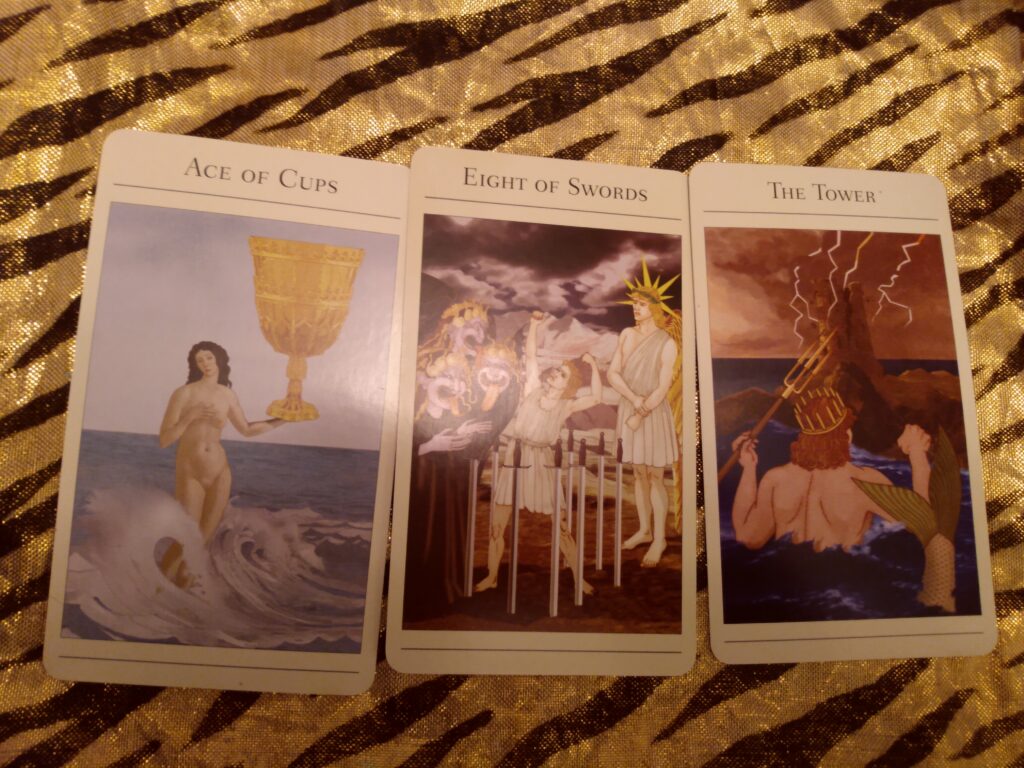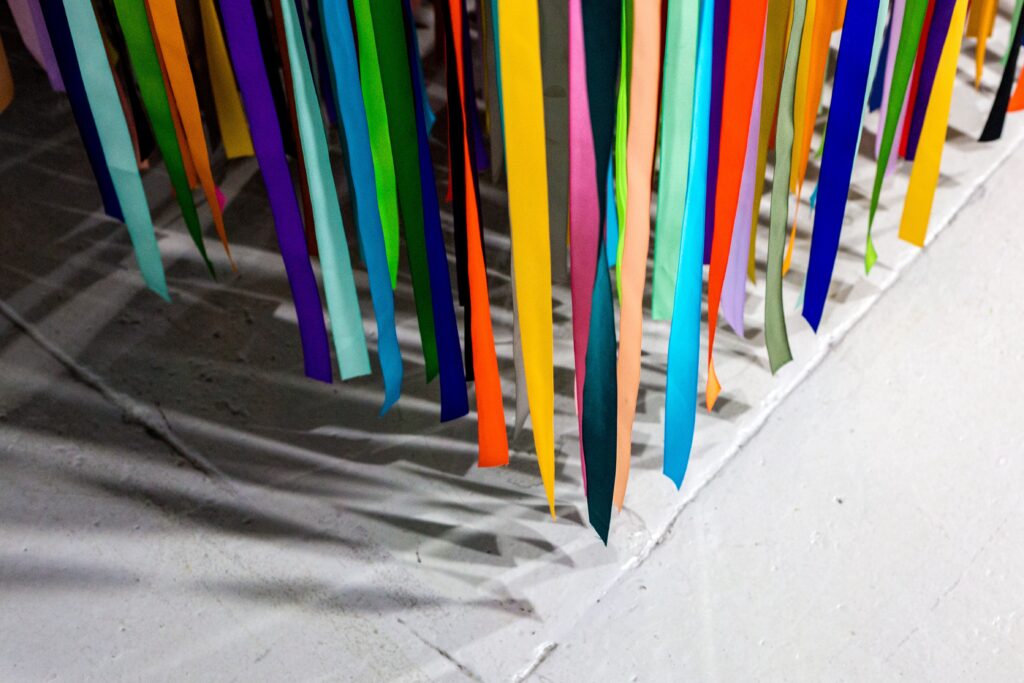Welcome to the end of the semester, Millsies!
Spring 2022 is coming to an end — along with, quite possibly, Mills College as we know it. With so much change on the horizon, it is essential that we remember to celebrate our accomplishments before moving to the next phase of life. As we have learned together, change is a part of life. Fear of change is a great indicator to look deeper into ourselves and ask how we might embrace our true feelings. In order to look back, let us gather together to celebrate all we have accomplished.
Regardless of fear, I invite you all to join me on the quest to answer one last question: How can we celebrate the past when the future scares us?

Today’s spread begins with the goddess Aphrodite, who is seen on the Ace of Cups emerging from the sea holding a single cup. Next comes the Eight of Swords, showing us a stuck Orestes surrounded by eight swords; and our final card is the Tower, where we see the Tower mid-destruction.
The Ace of Cups is a special card because it pertains to love. Aphrodite, who is being birthed from sea foam, represents the passions of love as well as the chaos of it. She is the offspring of Uranus, whose genitals were castrated and then thrown into the ocean. Foam floated to the surface of the water and Aphrodite was created from it. She is the essence of femininity, but also of vanity and spite. She is the embodiment of love and fills all of nature with passion. Though love can be fantastic, it is also consuming and can lead to illogical decisions rooted in passion rather than reason. As a force of nature, Aphrodite symbolizes an eruption of raw feeling. This card is an indicator that we are headed towards a great journey fueled by passion. Though this feeling can be overwhelming, it is also vital for the heart.
Our next card represents decision-making. In this second card, the Eight Of Swords, we see a trapped Orestes, surrounded by eight swords on the ground. To the right of Orestes, we see the sun god Apollo, who stands looking down sternly at the young man. To the left, we see three Furies, whose ugly faces are prepared to mock Orestes. What Orestes represents here is the bondage of fear. The knowledge of our own decision-making is clear in hindsight. When considering how to move forward, this clarity can scare us. There arises a fear of making the wrong decision.
When we fall victim to this fear, it creates a figurative cage that keeps us from making vital decisions. Here, we see Orestes struggling to make the choice to move forward. Orestes holds his fists up, trying to fend off the cage of swords for as long as he can; but at some point, he must make a decision in order to escape his trap. This card symbolizes the moment just before a difficult decision, when we feel guilt from our own participation in, and fear of, causing misfortune. When we must make a decision, others may be hurt or neglected. If we can accept our participation in the direction of our lives and stand by our true feelings, we are less likely to be paralyzed by indecision. We can work through difficulties and continue towards a solution.
The Tower follows as our last card and stands as both a final obstacle and a great beacon of hope. Though the challenge looms, we will survive it. In this card, we watch over Poseidon’s shoulder as The Tower, which is home to King Minos, is struck by lightning. Poseidon, the ruler of the sea, has come up to our world from the ocean floor to smite this structure. Minos had previously been gifted his throne with the help of Poseidon. Minos promised to give Poseidon a valuable and beautiful white bull upon receiving his throne. After Minos spends years refusing to give up the prized bull, Poseidon, losing patience, seeks Aphrodite’s help to intervene on his behalf. Aphrodite causes Minos’ wife Pasiphae to become inflamed with passion for the bull. Overtaken by lust, Pasiphae orders a wooden bull to be built, climbs inside the structure and allows the bull to mate with her.
The outcome of this punishing union is the mighty and feared Minotaur, which Minos hides away in his tower in a maze built underground to keep the beast trapped inside. The king believes himself safe and continues to refuse to give the bull to Poseidon. Thus, Poseidon finally strikes The Tower down, killing the royal family but setting all the enslaved serving the royal family free.
This card exemplifies our resistance to giving up what we deem beautiful but ultimately know is destructive. When we resist change and hide our shame, we become trapped by our own secrets, unable to live the lives we want. In order to celebrate ourselves, we must come to terms with endings and know not only what to keep but also what to let go. This involves being honest and realistic with ourselves about our inner desires so that we do not have to face the obstacle of shame. What is beautiful about this card is the fact that when the Tower falls, the enslaved are set free. The façade is broken, and we are free to be our truest selves, rather than be slaves to shame. Though the façade of the Tower may seem proud, deep inside there may be unaddressed issues or identities. It is important to accept our own changes so we may celebrate the journey.
Much is coming to a close, Millsies, and it is not abnormal to be afraid. I urge you all to face this fear and commend yourself for the journey you have taken to get here. Whatever comes next, we are worthy of freedom and praise. To aid in this effort, I offer a DIY that is customizable and fun to do (especially in groups)!

Attached are DIY instructions to make your very own ribbon mobile. Maybe you want to use Mills colors or your own favorite colors to decorate. The point of this exercise is to craft a gift for yourself that symbolizes your journey. You can use whatever you feel contributes to the celebration as long as the mobile hangs in a place you can use to stop and celebrate yourself.

